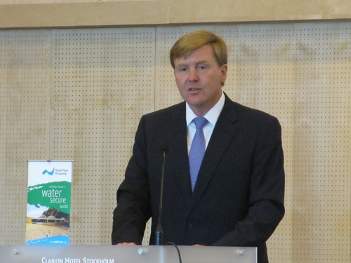Recalling his own involvement in GWP soon after its founding, the Prince said that some people at the 2nd World Water Forum in 2000 in The Hague (which he chaired), “questioned the need and relevance of yet another international organization in the field of water.” But, he concluded, “You have proven the relevance and uniqueness of GWP in such a way that today nobody could envisage an international water world without GWP!”
The Prince noted the growth of the GWP network at regional and country level, noting that “they work close to the ground, where water challenges are played out. At the local level it is abundantly clear that water security is a development imperative, without which all sectors of national economies will sooner or later fail.”
The Prince said: “My patronage of GWP, that first step, ultimately led Kofi Annan to ask me to chair his Advisory Board on Water and Sanitation.” He noted that the U.N. Secretary General’s Advisory Board on Water and Sanitation (UNSGAB) and GWP are closely related. “Our objectives for water resources management are closely aligned, and through the Commission on Sustainable Development, we put integrated water resources management planning on the international stage together,” he said. He then outlined UNSGAB's current focus areas - sanitation, innovation in wastewater management, water efficiency in agriculture to ensure both water security and food security - and set out his expectations of GWP. “These are the messages [UNSGAB is] promoting in the Rio 2012 process with the hope that the Summit next year will help frame the development agenda for the foreseeable future. I fully expect that GWP will be working closely with UNSGAB now and in the future to implement these messages.”
The GWP Annual Lecture came at the close of the annual gathering of GWP Partners who met for two days to address the theme “Water Security as a Catalyst for Achieving Food Security.” The subject is particularly relevant in light of the current food crisis caused by drought in Eastern Africa and the doubling of food prices between 2006 and 2008 with even further increases in 2010.
The Prince presented three key focus areas of the U.N. Advisory Board—sanitation, innovation in wastewater management, and water efficiency in agriculture—and expressed his expectation that GWP would work with the Board in the run-up to the U.N. Conference on Sustainable Development in 2012, “with the hope that the Summit next year will help frame the development agenda for the foreseeable future.”
Despite the world’s progress in improving access to sanitation, the Prince lamented that, “We are not keeping pace with demographic growth, which means that according to current trends, by 2015, more people, not fewer, will lack safe sanitation facilities. Daunting statistics, and behind them, immeasurable human suffering, a disheartening case of global inequity, lost opportunities for economic growth, and growing environmental degradation.”
Calling for a “wastewater revolution”, the Prince said that the world must see wastewater as a resource: “there is no wastewater, only water that is wasted.” Technology can play a key role in ensuring that “polluted water is treated before it's returned to the environment,” said the Prince, citing a few examples.
“Moving towards a water and food secure world cannot be realized by one sector,” said the Prince in addressing the issue of water efficiency in agriculture. He outlined the various challenges in providing food for the world: population growth, urbanization, changing diets, rising food prices, the financial crisis, the impact of climate change, and disasters such as floods and droughts. In all of this, he said, “water does not yet receive the attention it deserves…. Ownership by decision makers of the water security agenda is thereby of paramount importance.”
In noting the different roles of the Advisory Board and GWP, the Prince said, “While the Advisory Board influences decision makers to prioritize water and sanitation challenges, the Global Water Partnership provides a network along with practical steps to help countries in designing their food and water security strategies.”
“Water is the medium that links the challenges of food security, energy security, climate change, economic growth and human livelihoods,” said the Prince, reaffirming a key GWP message. “On the way to Rio+20, convincing and shared messages are required to convince leaders of this truth,” he added. “I'm sure many of us in this room remember the global commitment to forging a better future that was expressed in 1992 [at the UN Conference on Environment and Development, the "Earth Summit" in Rio de Janeiro]…. Let's work together to ensure that Rio+20 lives up to and even exceeds the Earth Summit's legacy.”
Complete text of the 2011 GWP Annual Lecture.
For more information, contact:
Steven Downey, Head of Communications, +46 (0)8 522 126 52
Helene Komlos Grill, Communications Officer, +46 (0)8 522 126 53
_________________________________________________
The Global Water Partnership (GWP) vision is for a water secure world. Its mission is to support the sustainable development and management of water resources at all levels. GWP was created in 1996 to foster the implementation of integrated water resources management (IWRM): the coordinated development and management of water, land, and related resources by maximising economic and social welfare without compromising the sustainability of ecosystems and the environment. The GWP comprises 13 Regional Water Partnerships and 80 Country Water Partnerships, and over 2,400 Partner organizations in 158 countries.

